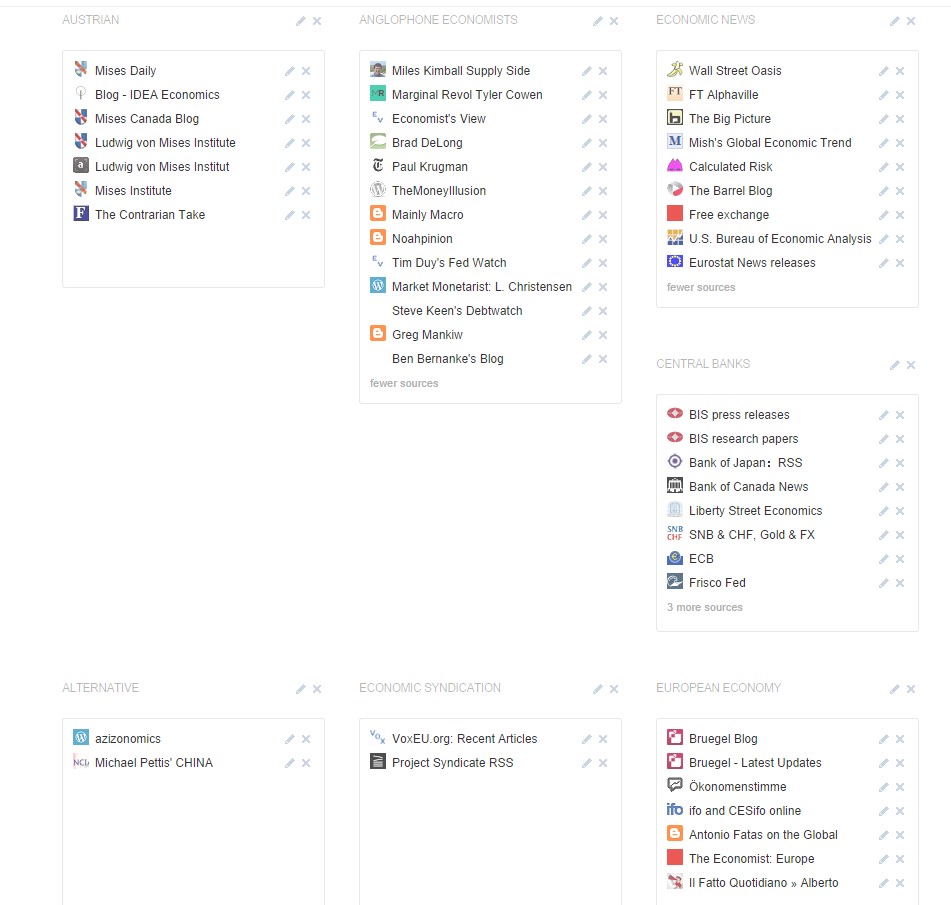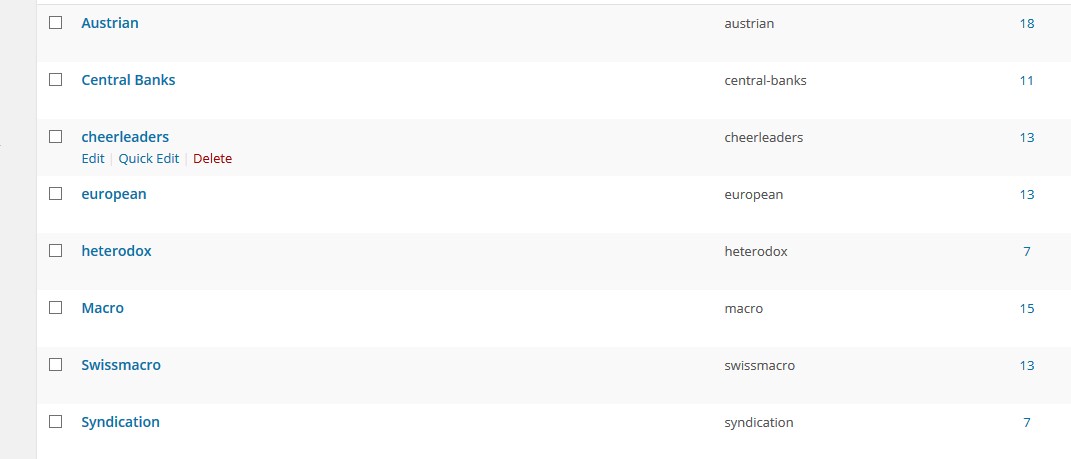Page no: P31y
As first step we must set up links and link categories.
Link categories correspond to subdomains. We have now created all links for our eight subdomains that correspond to Link Categories.
Full list of subdomains
This is the list of subdomains to be created:
- austrian.economicblogs.org
- central-banks.economicblogs.org
- leaders.economicblogs.org
- european.economicblogs.org
- heterodox.economicblogs.org
- macro.economicblogs.org
- swiss.economicblogs.org
- syndication.economicblogs.org
Basis for creating links and Link Categories: Feedly |
|
Link CategoriesLink categories correspond to subdomains. We first need to set up the 8 link categories (not “post categories”) and all the links. This task is done, the latest Version of link categories is the following: |
|
Links and FeedsA link in WordPress corresponds to a blog.
Then we have a link category, descriptions and notes (a long text on the blog).
The description below shows how to assign feeds to links.
Example: Tom Woods, Austrian economics subdomain
|
 |
| 2) Create notes for this link based on the data on the linked page for each blog and author. |  |
We import this text into the notes: |
 |
Choice of 17 blogs/links for Austrian economics
We added this information into
| Chosen? | Name | Twitter Followers | Facebook Likes | URL | RSS Feed | Notes | Image URL |
|---|---|---|---|---|---|---|---|
| Yes | Tom Woods | 28,120 | 60,401 | Link | Link | Thomas E. Woods, Jr., is a senior fellow of the Ludwig von Mises Institute and host of The Tom Woods Show, which broadcasts every weekday. He holds a bachelor’s degree in history from Harvard and his master’s, M.Phil., and Ph.D. from Columbia University. Woods has appeared on CNBC, MSNBC, FOX News Channel, FOX Business Network, C-SPAN, and Bloomberg Television, among other outlets, and has been a guest on hundreds of radio programs, including National Public Radio, the Dennis Miller Show, the Michael Reagan Show, the Dennis Prager Show, and the Michael Medved Show. He is a regular fill-in host on The Peter Schiff Show. Woods is also the author of eleven books, most recently Rollback: Repealing Big Government Before the Coming Fiscal Collapse and Nullification: How to Resist Federal Tyranny in the 21st Century. |  |
| Yes | The Ludwig Von Mises institute of Canada | 894 | 2,338 | Link | Link | The Ludwig Von Mises institute of Canada (“Mises Canada”) was founded in November of 2010 in order to spread the teachings of the Austrian School of Economics to Canada. It is an independent organization making up one of the many Mises Institutes now operating in over 20 countries. It is the mission of Mises Canada to educate the public on the importance of placing human choice at the center of economic theory, to encourage a revival of critical historical research, and to advance the Misesian tradition of thought through the defense of the market economy, private property, sound money, and peaceful international relations. |  |
| Yes | Mises United States | 47,504 | 114,836 | Link | Link | The Mises Institute is the world’s largest, oldest, and most influential educational institution devoted to promoting Austrian economics, freedom, and peace in the tradition of classical liberalism. Since 1982, the Mises Institute has provided both scholars and laymen with resources to broaden their understanding of the economic school of thought known as Austrian economics. This school is most closely associated with our namesake, economist Ludwig von Mises. We are the worldwide epicenter of the Austrian movement. Through their research in the fields of economics, history, philosophy, and political theory, Mises’s students F.A. Hayek, Henry Hazlitt, Murray Rothbard, and others carried the Austrian School into the late twentieth century. Today, Mises Institute scholars and researchers continue the important work of the Austrian School. Austrian economics is a method of economic analysis, and is non-ideological. Nonetheless, the Austrian School has long been associated with libertarian and classical-liberal thought—promoting private property and freedom, while opposing war and aggression of all kinds. The Mises Institute continues to support research and education in this radical pro-freedom tradition of historians, philosophers, economists, and theorists such as Jean-Baptiste Say, Frédéric Bastiat, Richard Cobden, Herbert Spencer, Lysander Spooner, William Graham Sumner, Albert Jay Nock, Mises, Hayek, Hazlitt, Rothbard, and many others. |  |
| YES | Schiff Gold | 1,355 | 4,946 | Link | Link | Peter Schiff is an American businessman, investment broker and financial commentator. Schiff is the CEO and chief global strategist of Euro Pacific Capital Inc. |  |
| YES | Monty Pelerin’s World | Link | Link | The site deals with Finance, Economics and Politics. Investment advice is not provided, although thoughts useful to investors might occasionally appear. My political and economic philosophy rests on maximum freedom. This orientation is based on study and empirics. It is a utilitarian conclusion in that it produces better outcomes (higher standards of living, longer life expectancies, etc.) than the alternatives. But it also works on ethical and moral grounds. This philosophy is beneficial to all, not specific segments of society. I was taught Keynesianism and Monetarism in formal classwork. I know the “Chicago” school well, having taken courses from Milton Friedman, George Stigler, Ronald Coase and Gene Fama, all now Nobel laureates. Despite this exposure, I consider my approach to economics and society “Austrian,” in the tradition of Ludwig von Mises and Friederich Hayek. Chicago and Austrian free market conclusions often match, although their methodologies are vastly different. |  |
||
| YES | Mercatus Center | 18,536 | 24,830 | Link | Link | The Mercatus Center at George Mason University is the world’s premier university source for market-oriented ideas—bridging the gap between academic ideas and real-world problems. A university-based research center, the Mercatus Center advances knowledge about how markets work to improve people’s lives by training graduate students, conducting research, and applying economics to offer solutions to society’s most pressing problems. Our mission is to generate knowledge and understanding of the institutions that affect the freedom to prosper, and to find sustainable solutions that overcome the barriers preventing individuals from living free, prosperous, and peaceful lives. Founded in 1980, the Mercatus Center is located on George Mason University’s Arlington campus. |  |
| YES | Ludwig von Mises Institute | 47,504 | Link | Link | The Mises Institute is the world’s largest, oldest, and most influential educational institution devoted to promoting Austrian economics, freedom, and peace in the tradition of classical liberalism. Since 1982, the Mises Institute has provided both scholars and laymen with resources to broaden their understanding of the economic school of thought known as Austrian economics. This school is most closely associated with our namesake, economist Ludwig von Mises. |  |
|
| YES | John Lott’s Website | 7,610 | Link | Link | This blog is run by John R. Lott, Jr., a Senior Research Scientist at the University of Maryland Foundation, University of Maryland at College Park. His blog features commentary on a broad array of economics and crime related issues. | ||
| YES | Robert Murphy: Free Advice | 7,885 | Link | Link | Robert Murphy, an adjunct scholar of the Mises Institute and a faculty member of the Mises University, runs the blog Free Advice and is the author of The Politically Incorrect Guide to Capitalism, the Study Guide to Man, Economy, and State with Power and Market, the Human Action Study Guide, and The Politically Incorrect Guide to the Great Depression and the New Deal. |  |
|
| YES | EconLog | 7,347 | Link | Link | The Library of Economics and Liberty features the popular daily blog, EconLog. Bloggers Bryan Caplan, David Henderson, and guest bloggers—write on topical economics of interest to them, illuminating subjects from politics and finance, to recent films and cultural observations, to history and literature. EconLog aims to educate, entice, and excite readers into thinking about economics in daily analyses. It typically appeals to an international mix of college-educated students, teachers, news media commentators, and bloggers; self-educated or post-graduate thinkers; and those interested in understanding the ever-emerging current economic situation. Readers are invited to comment. EconLog is one of the Wall Street Journal’s Top 25 Economics Blogs. EconLog took wing in January 2003, initially inspired by Arnold Kling’s earlier educational economics blog (Great Questions of Economics [GQE]). Bryan Caplan joined in January 2005, and David Henderson in October 2008. Guest bloggers, including Garett Jones, Art Carden, Alberto Mingardi, Bart Wilson, James Schneider, and Scott Sumner, have contributed to EconLog since the autumn of 2012. |  |
|
| YES | Peter Boettke: Coordination Problem | Link | Link | This blog is very focused on news and current affairs from an Austrian point of view. The blog is written by Pete Boettke, Chris Coyne, Steve Horwitz, Peter Leeson, David Prychitko, and Frederic Sautet. |  |
||
| YES | Carpe Diem | 6,548 | Link | Link | Dr. Mark J. Perry is a professor of economics and finance in the School of Management at the Flint campus of the University of Michigan. Perry holds two graduate degrees in economics (M.A. and Ph.D.) from George Mason University near Washington, D.C. In addition, he holds an MBA degree in finance from the Curtis L. Carlson School of Management at the University of Minnesota. In addition to a faculty appointment at the University of Michigan-Flint, Perry is also a visiting scholar at The American Enterprise Institute in Washington, D.C. |  |
|
| YES | Adam Smith Institute | 19.661 | 17.957 | Link | Link | The Adam Smith Institute is one of the world’s leading think tanks. Independent, non-profit and non-partisan, it works to promote libertarian and free market ideas through research, publishing, media commentary, and educational programmes. The Institute is today at the forefront of making the case for free markets and a free society in the United Kingdom. The Institute was founded in the 1970s, as post-war socialism reached its high-watermark. Then, as now, its purpose was to educate the public about free markets and economic policy, and to inject sound ideas into the public debate. It has always been a practical think-tank rather than an academic organization, and despite its strict political independence, it has endeavored to work with policymakers to deliver real change, and to make free market ideas reality. In its early days, the Institute was known for its pioneering work on privatization, deregulation, and tax reform, and for its advocacy of internal markets in healthcare and education. |  |
the base table with 40 blogs was:
Use this site as basis
We only use the 17 authors with a YES.
Tags: Austrian economics, blogs, links
See more for





























